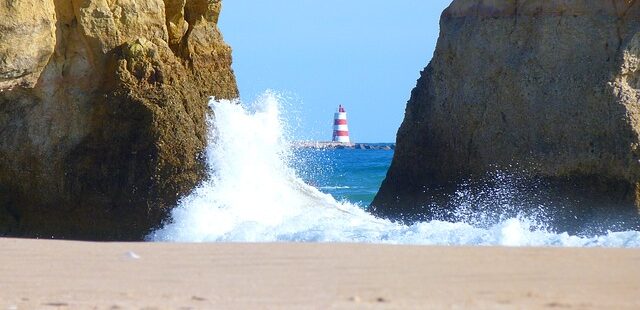The El Jadida–The Algarve Migration Route
Luís Calle y Bonaccorso*
El Jadida (الجديد) is a port-city located on the Atlantic coast of Morocco. The crossing by sea from El Jadida to The Algarve in the southernmost part of Portugal’s mainland, takes approximately forty to fifty hours. The first registered crossing took place in 2007, when a group of twenty-three Moroccan nationals landed in Culatra Island, in Olhão. After informed by local fishers of the landing, the Portuguese authorities proceeded to arrest the migrants.[1]
The impact of this first crossing should not be underestimated. Indeed, the 2007 Annual International Security Report expressed the concern of the Portuguese authorities that further attempts could take place.[2] Notwithstanding, the next registered crossing only occurred in 2019, when eight Moroccan nationals arrived in Monte Gordo using one vessel.[3]The eight migrants were detained and although all requested international protection, only one such request was accepted. It should be noted that a second vessel was found, but the authorities could not locate its occupants. They believe that there were possibly four persons onboard the second vessel. [4]
Following this event, between December 2019 and January 2020, ninety-seven migrants, mostly Moroccan nationals, crossed over from El Jadida. Sixty-seven requested international protection, although only eleven eventually saw their requests accepted. Forty-four are in unknown location and eleven placed in other Member-States of the European Union (EU). One migrant willingly returned to Morocco, while eight were sent back by the Portuguese authorities. Thirty-three out of the ninety-seven remain in Portugal. [5]
During the month of June 2020, Moroccan authorities arrested twenty-three migrants trying to depart from El Jadida using two vessels. Two months later the Moroccan authorities arrested two smugglers preparing the crossing of thirty-five migrants.[6] Subsequently, authorities arrested three smugglers on the same grounds.[7] That same year, a vessel leaving from El Jadida sunk, killing all twenty-four migrants on board, including children.[8] On March 2021, while out on patrol, the Portuguese authorities found a small vessel that had no occupants onboard, only fuel and food. After a few hours, the authorities found, already on land, three Moroccan nationals showing signs of extreme fatigue. After approaching them, the authorities confirmed that they had entered illegally in Portugal and were part of a group of approximately fifteen people.[9]
More recently, last November, the Portuguese navy rescued at sea thirty-seven migrants onboard a very precarious vessel that had been drifting for approximately one week. This was a rescue at sea operation carried out in the Portuguese exclusive economic zone. It was not the detention of migrants entering illegally in Portugal. However, the precise point of departure of this vessel remains unclear, although it is likely that it might have been El Jadida.
The use of the El Jadida–The Algarve route can be the result of the fact that the surveillance systems in use, namely the Integrated Surveillance, Command and Control System of the Portuguese Coast, are unable to detect the kind of perilous vessels used by the migrants. This prompted the remarks by the head of the workers union of the Portuguese Immigration and Borders Service that the coast of The Algarve is vulnerable to international criminal networks of illegal migration.[10] Related with the aforementioned, one may also consider the likely connection between these and human trafficking networks. Indeed, there are reports of human trafficking being associated with criminal organizations in Morocco, with links in Members-States of the EU.[11]
Thus far there has been a dismissal of the relevancy of El Jadida–The Algarve route by the Portuguese Government, on the basis that when compared to Spain and other Member-States of the EU these crossings are not considered to be part of an illegal network targeting Portugal as either destination or transit State.[12] This dismissal came after El Jadida was confirmed as port of departure by the Portuguese authorities.[13]
On 12 January 2022, the Portuguese and Moroccan Governments signed an agreement on the entry conditions for Moroccan workers in Portugal. Both States are also part of to the Global Compact for Migration[14] and are committed to the issue of illegal migration and human trafficking.[15]
In the following weeks the Migration and Law of the Sea team will be conducting several podcasts to explore the many implication of the El Jadida–The Algarve Migration route. We will be talking to Mrs. Valentina Marcelino, a Portuguese reporter who closely followed these events and who will give us a better understanding of the factual reality of the route. We will be also discussing the international legal implications of the route with Professor Vasco Becker-Weinberg. Also relevant to the study of the route is understanding the connection between migrant smuggling and human trafficking in the context of the Maghreb. To help us understand this connection we have invited Mrs. Joana Daniel Wrabetz (TBC) from the United Nations Office on Drugs and Crime. We will be also hearing from Professor Bahija Jamal (TBC) of the Faculty of Law of the Hassan II University in Morocco in order to get a better understanding of the legal implications of the route from a Moroccan perspective.
* The author would like to acknowledge and express his appreciation for the contributions made by the members of the Migration and Law of the Sea team.
[1] https://www.dn.pt/arquivo/2007/23-africanos-falham-cadis-e-chegam-a-olhao-991234.html
[2] https://www.historico.portugal.gov.pt/media/564311/rasi_2007.pdf
[3] https://observador.pt/2019/12/11/oito-migrantes-do-norte-de-africa-detidos-no-algarve-apos-desembarcarem-em-monte-gordo/
[4] https://www.portugal.gov.pt/download-ficheiros/ficheiro.aspx?v=%3D%3DBQAAAB%2BLCAAAAAAABAAzNDA0sAAAQJ%2BleAUAAAA%3D
[5] https://www.portugal.gov.pt/download-ficheiros/ficheiro.aspx?v=%3d%3dBQAAAB%2bLCAAAAAAABAAzNDQ1NAUABR26oAUAAAA%3d; https://www.dn.pt/sociedade/migrantes-marroquinos-trio-que-desembarcou-no-algarve-envolvido-em-crimes-violentos-14270489.html
[6] https://northafricapost.com/43002-morocco-foils-illegal-migration-attempt-in-el-jadida-arrests-two-smugglers.html
[7] https://www.dn.pt/poder/marrocos-repatriaremos-todos-os-nossos-cidadaos-depois-da-pandemia-12760802.html
[8] https://www.rtp.pt/noticias/pais/morreram-afogados-24-migrantes-marroquinos-que-tentavam-chegar-a-portugal_v1270307
[9] https://www.jn.pt/justica/marroquinos-detidos-confirmam-desembarque-ilegal-no-algarve-13516000.html
[10] https://www.publico.pt/2020/07/02/sociedade/noticia/radares-algarve-falham-deteccao-imigrantes-ilegais-dependemos-boa-vontade-pescadores-1922857
[11] https://www.dn.pt/edicao-do-dia/26-out-2020/migrantes-marroquinos-recrutamento-para-gangues-da-ue-sob-suspeita-12930069.html
[12] https://www.publico.pt/2020/06/17/sociedade/noticia/portugal-nao-cair-ridiculo-falar-rede-ilegal-algarve-1920828
[13] https://www.dn.pt/edicao-do-dia/06-out-2020/sef-descobre-rota-de-marroquinos-gnr-e-marinha-reforcam-vigilancia-12873031.html
[14] https://www.iom.int/global-compact-migration
[15] https://www.portugal.gov.pt/pt/gc22/comunicacao/noticia?i=portugal-e-marrocos-celebram-acordo-relativo-ao-emprego-e-a-estada-dos-trabalhadores-marroquinos-em-portugal
COMO CITAR ESTE BLOG POST: Calle y Bonaccorso, Luís. “The El Jadida–The Algarve Migration Route”. NOVA Refugee Clinic Blog, fevereiro de 2022. Disponível em: https://novarefugeelegalclinic.novalaw.unl.pt/?blog_post=the-el-jadida-the-algarve-migration-route



